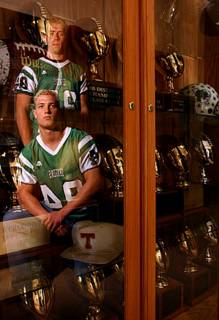If anyone wants to accuse me of having a hard head, they're right. I had a hockey puck bounce off my skull during a game I shot this week. It came to hit me between the eyes, but I saw it in time and reacted. Unfortunately I pulled a leg muscle at a previous assignment (a parade), so my body didn't react at its normal speed.
Bad, bad, bad old body.We're going to look into my brain today. I know it's a scary place. However, I want to discuss some basic issues of America. Since
Fayrouz is preparing for finals, somebody has to vent this stuff to the outside world.
I've done a few general news stories this week. During the holiday season, reporters tend to lean on standard stories. These let the frantic readers/shoppers know the world is OK and the government doesn't function like the shopping mall (a big relief). From this week's assignments, countless elections and police ride-alongs in drastically different cities, I want to discuss two topics in relation to American democracy.
Topic 1.American democracy starts in Kindergarten (pre-K or day care actually). From a very young age, children are taught to vote for what they want. They also learn to take responsibility for their authority.
Yes, everyone wants to be the leader - until they are the leader and are responsible for the actions (or misbehaviors) of others. Once the child is voted the daily leader, they're suddenly the responsible party in the room.
If the pint-sized elected leaders are good politicians, everyone behaves themselves and the leaders make it through the day unscathed. If they arn't politically savvy kids, then they get the blame for everything. Either way, they learn about the system and they live to tell about it another day.
The voting system of kindergarten is simple. Everyone places their head on their desk and closes their eyes. They raise their hand for what they want (of teacher-mandated options). The votes are counted and the losers are stuck with what the majority wanted. Better luck next time.
The process seems fair to the majority of the children. It continues this way with increasing levels of responsibility until adulthood.
The adult political system tends to start with the PTA (Parent Teacher Association). I've covered politicians for several years and many of them start their political career at the PTA. A parent wants the best for their little kindergartener and decides to run for office in the elementary PTA. This leads to running for president of the school PTA.
Now, the person has a political base to begin work. People know and can trust (or later remove) this person in other elections.
If the person is a good PTA leader, the logical next step is the local school board. This involves the formal political system with an actual voting public and governing laws. Because it's the most grass-roots campaign, it's actually one of the most critical. Whomever is elected at this level WILL affect the future of the area's children.
Politicians at this level learn to raise money and advertise. More critically, they learn to get people into the voting booth because these races typically do not get a high voter turnout.
Again, if they do well in office, they may choose to advance to another level. City government is the next election step and so forth. This is how a majority of elected American leaders evolve. They weren't necessarily the best person for the job, but they were the person willing to accept the responsibility to lead. They also had the most people in the polling place on voting day.
If a voter votes for them, good for the winners. If a voter votes against them, better luck next time. If a voter stayed home and didn't vote, shut up and take whatever YOU (the apathetic voter) let happen.
The children learn the process from hearing about it from the parents. Political opinions are cheap and plentiful here.
Topic 2The other issue is code enforcement.
Each normal-sized city has at least one code enforcement officer. S/he isn't a police officer and carries no weapon. Instead, s/he carries a clipboard and writes down code violations from the safety of a pickup truck.
Newer housing developments often don't have any codes (or dangerously sub-standard codes). It's the city government's job to create a set of local codes (mini-laws) for the safety of residents.
For these codes to work, they must be enforced and create an adherence through bad example and subsequent punishment (preferably on one of the local "untouchables" to show fairness). Examples of codes include how high a city allows grass to grow, how close to the property line a building can stand, or how large amounts of garbage are to be handled (reconstruction or tree trimmings), etc. ...
Once a city has the codes, the officer identifies the violators and sends them a notice to repair in the mail. After a specified amount of time, the code officer checks for code adherence. If the code is still in violation, the city normally makes the repair and levels a fine against the property owner and possibly attaches it to the property deed. The point is to have the code violation fixed and to have a punishment compelling enough to deter possible violators.
Through all my ride-alongs with police, I've found the same people who flagrantly violate city codes are also the ones who violate other major laws. Those who tend to follow all the city rules also tend to follow the big laws. There are exceptions, but it's a good benchmark when rolling into a neighborhood for a shoot.
Enough for now,




